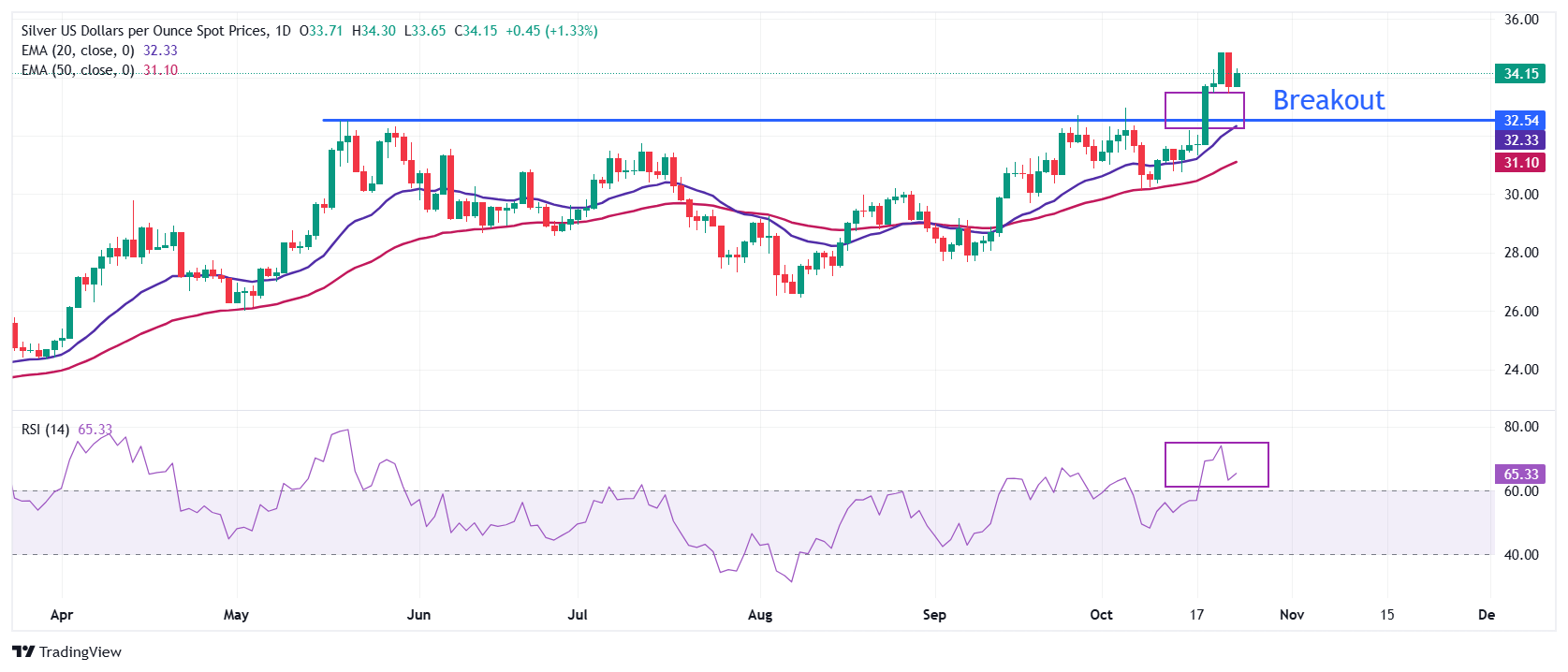Silver Price Forecast: XAG/USD bounces back above $34 on safe-haven bid
- Silver price recovers above $34.00 as US yields tumble.
- The Fed is expected to pursue a moderate rate-cut approach.
- Geopolitical tensions surrounding the Middle East limit the downside in the Silver price.
Silver price (XAG/USD) rebounds strongly above $34.00 in Thursday’s European session after declining to near $33.40 on Wednesday. The white metal bounces back as US bond yields tumble after a sharp rally in the past few weeks. 10-year US bond yields plummet to 4.19%, down 1.28% at the time of writing.
Lower yields on interest-bearing assets reduce the opportunity cost of holding an investment in non-yielding assets, such as Silver. Meanwhile, the US Dollar has also faced a slight correction after a sharp rally. The US Dollar Index (DXY), which tracks the Greenback’s value against six major currencies, slides to near 104.15 after posting a fresh 12-week high around 104.50 on Wednesday.
The outlook of US yields and the Greenback remains firm as investors expect the Federal Reserve (Fed) to follow a moderate interest rate cut cycle. According to the CME FedWatch tool, the central bank is expected to cut interest rates by 25 basis points (bps) in November and December.
In today’s session, investors will focus on the flash United States (US) S&P Global PMI data for October, which will be published at 13:45 GMT.
The Silver price remains well-supported due to uncertainty over the United States (US) presidential elections, which are coming in less than two weeks and escalating Middle East tensions. The scenario of geopolitical and political uncertainty bodes well for precious metals, such as Silver price, as investors use the asset as a hedge in risky market conditions.
Silver technical analysis
Silver price recovers sharply after a mild correction to near $33.40. The white metal aims to revisit a fresh over 12-year high near $35.00. The asset strengthened after breaking above the horizontal resistance plotted from the May 21 high of $32.50 on a daily timeframe, which will act as support for now. Upward-sloping 20- and 50-day Exponential Moving Averages (EMAs) near $32.30 and $31.10, respectively, signal more upside ahead.
The 14-day Relative Strength Index (RSI) oscillates above 60.00, points to an active bullish momentum.
Silver daily chart
Silver FAQs
Silver is a precious metal highly traded among investors. It has been historically used as a store of value and a medium of exchange. Although less popular than Gold, traders may turn to Silver to diversify their investment portfolio, for its intrinsic value or as a potential hedge during high-inflation periods. Investors can buy physical Silver, in coins or in bars, or trade it through vehicles such as Exchange Traded Funds, which track its price on international markets.
Silver prices can move due to a wide range of factors. Geopolitical instability or fears of a deep recession can make Silver price escalate due to its safe-haven status, although to a lesser extent than Gold's. As a yieldless asset, Silver tends to rise with lower interest rates. Its moves also depend on how the US Dollar (USD) behaves as the asset is priced in dollars (XAG/USD). A strong Dollar tends to keep the price of Silver at bay, whereas a weaker Dollar is likely to propel prices up. Other factors such as investment demand, mining supply – Silver is much more abundant than Gold – and recycling rates can also affect prices.
Silver is widely used in industry, particularly in sectors such as electronics or solar energy, as it has one of the highest electric conductivity of all metals – more than Copper and Gold. A surge in demand can increase prices, while a decline tends to lower them. Dynamics in the US, Chinese and Indian economies can also contribute to price swings: for the US and particularly China, their big industrial sectors use Silver in various processes; in India, consumers’ demand for the precious metal for jewellery also plays a key role in setting prices.
Silver prices tend to follow Gold's moves. When Gold prices rise, Silver typically follows suit, as their status as safe-haven assets is similar. The Gold/Silver ratio, which shows the number of ounces of Silver needed to equal the value of one ounce of Gold, may help to determine the relative valuation between both metals. Some investors may consider a high ratio as an indicator that Silver is undervalued, or Gold is overvalued. On the contrary, a low ratio might suggest that Gold is undervalued relative to Silver.

